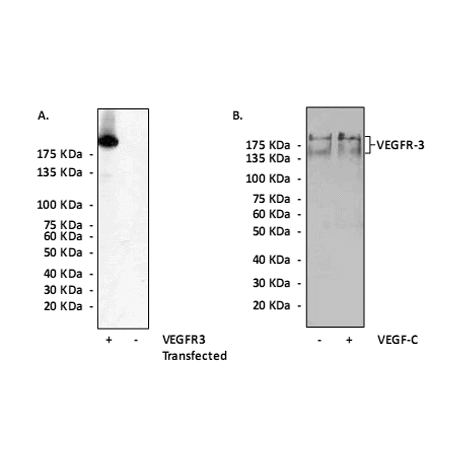Product Sheet CB5792
Description
BACKGROUND The Vascular Endothelial Growth Factor Receptor (VEGFR) family has three members: VEGFR-1 (also known as flt-1), VEGFR-2 (KDR/flk-1), and VEGFR-3 (FLT4). In VEGFR-3, the fifth Ig homology domain of the extracellular portion is proteolytically cleaved and the resulting polypeptides remain linked by twodisulfide bonds.1 The ligands binding to VEGFRs belong tothe VEGF family of growth factors, which has five cellular members: VEGF, placenta growth factor (PlGF), VEGF-B, VEGF-C, VEGF-D, and the recently cloned viral VEGF homologue VEGF-E.2 VEGFR-3 is requiredfor cardiovascular development during embryogenesis. In adults,this receptor is expressed in lymphatic endothelial cells. VEGF-C and VEGF-D are VEGFR3 ligands. The binding of VEGF ligands to VEGFRs activates VEGFR3 signaling, which regulates cardiovascular development, angiogenesis, and lymphangiogenesis.3
RECENT PUBLICATIONS
Liu, J., Y. Cheng, M. He, and S. Yao. 2014. Vascular endothelial growth factor C enhances cervical cancer cell invasiveness via upregulation of galectin-3 protein. Gynecological Endocrinology 30:461-465.
Stewart, J., X. Ma, M. Megison, H. Nabers, W. Cance, E. Kurenova, and E. Beierle. 2015. Inhibition of FAK and VEGFR-3 binding decreases tumorigenicity in neuroblastoma. Molecular Carcinogenesis, 54:9-23.
REFERENCES
1. Otrock, Z.K. et al. : Blood Cells Mol Dis. 38:258, 2007.
2. Taipale, J. et al.: Curr Top Microbiol Immunol. 237:85, 1999.
3. Su, J.L. et al.: Br J Cancer. 96:541, 2007.
2. Taipale, J. et al.: Curr Top Microbiol Immunol. 237:85, 1999.
3. Su, J.L. et al.: Br J Cancer. 96:541, 2007.
Products are for research use only. They are not intended for human, animal, or diagnostic applications.

(Click to Enlarge) Figure A: Specific detection of VEGF receptor-3 proteins from 293 cells transfected with a human VEGF receptor-3 expression vector by Western Blot analysis using VEGF Receptor-3 Rabbit Polyclonal Antibody. Figure B: Human Dermal Lung Endothelial Cells (HDLMVEC) (Cat# 100-05a) were stimulated with VEGF-C (50ng/ml for 5 min). VEGF-C stimulated HDLMVEC Lysate was subjected to Western Blot analysis using VEGFR3 Antibody (Cat# CB5792).
Details
Cat.No.: | CB5792 |
Antigen: | E. coli-expressed expressed cytoplasmic domain of human VEGF receptor-3. |
Isotype: | Rabbit Polyclonal IgG |
Species & predicted species cross- reactivity ( ): | Human |
Applications & Suggested starting dilutions:* | WB 1:1000 IP n/d IHC (Paraffin) n/d ICC n/d FACS n/d |
Predicted Molecular Weight of protein: | 195 kDa |
Specificity/Sensitivity: | Anti-VEGFR3 specifically detects endogenously expressed human VEGF receptor-3. This antibody does not cross-react with other VEGFR-family members. |
Storage: | Store at -20°C, 4°C for frequent use. Avoid repeated freeze-thaw cycles. |
*Optimal working dilutions must be determined by end user.
Products
| Product | Size | CAT.# | Price | Quantity |
|---|---|---|---|---|
| Rabbit VEGFR3 Antibody: Polyclonal Vascular Endothelial Growth Factor Receptor 3 Antibody | Size: 100 ul | CAT.#: CB5792 | Price: $333.00 |
Resources/Documents
Publications
2016
Bailey, E., Y. Cui, A. Casey, J. Stoler, X. Ai, D. Ma, R. Handin, P. Sliz, S. Vargas and S. El-Chemaly. 2016. Pulmonary Vasculopathy Associated with FIGF Gene Mutation. Am J Pathol, 187:25-32
Zopf, D., I. Fichtner, A. Bhargava, W. Steinke, K. Thierauch, K. Diefenbach, S. Wilhelm, F. Hafner and M. Gerisch. 2016. Pharmacologic activity and pharmacokinetics of metabolites of regorafenib in preclinical models. Cancer Medicine, 5:3176-3185.
2015
Stewart, J., X. Ma, M. Megison, H. Nabers, W. Cance, E. Kurenova, and E. Beierle. 2015. Inhibition of FAK and VEGFR-3 binding decreases tumorigenicity in neuroblastoma. Molecular Carcinogenesis, 54:9-23.
2014
Liu, J., Y. Cheng, M. He, and S. Yao. 2014. Vascular endothelial growth factor C enhances cervical cancer cell invasiveness via upregulation of galectin-3 protein. Gynecological Endocrinology 30:461-465.
2012
Kashima, K., M. Watanabe, Y. Satoh, J. Hata, N. Ishii and Y. Aoki. 2012. Inhibition of lymphatic metastasis in neuroblastoma by a novel neutralizing antibody to vascular endothelial growth factor-D. Cancer Science, 103:2144-2152.
